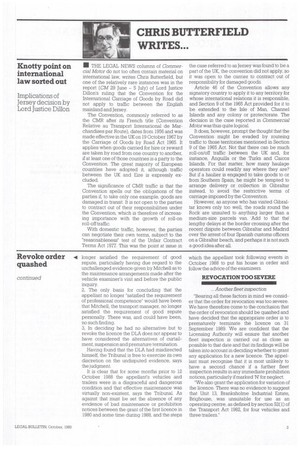CHRIS BUTTERFIELD WRITES...
Page 151

If you've noticed an error in this article please click here to report it so we can fix it.
• THE LEGAL NEWS columns of Commercial Motor do not too often contain material on international law, writes Chris Butterfield, but one of the relatively rare instances was in the report (CM 29 June 5 July) of Lord Justice Dillon's ruling that the Convention for the International Carriage of Goods by Road did not apply to traffic between the English mainland and Jersey.
The Convention, commonly referred to as the CMR after its French title (Convention Relative au Transport International de Marchandises par Route), dates from 1956 and was made effective in the UK on 19 October 1967 by the Carriage of Goods by Road Act 1965. It applies when goods carried for hire or reward are taken by road from one country to another, if at least one of those countries is a party to the Convention The great majority of European countries have adopted it, although traffic between the UK and Eire is expressly excluded, The significance of CMR traffic is that the Convention spells out the obligations of the parties if to take only one example, goods are damaged in transit It is not open to the parties to contract out of their responsibilities under the Convention, which is therefore of increasing importance with the growth of roll-on roll-off traffic.
With domestic traffic, however, the parties can negotiate their own terms, subject to the "reasonableness" test of the Unfair Contract Terms Act 1977. This was the point at issue in the case referred to as Jersey was found to be a part of the UK, the convention did not apply, so it was open to the carrier to contract out of responsibility for damaged goods.
Article 46 of the Convention allows any signatory country to apply it to any territory for whose international relations it is responsible, and Section 9 of the 1965 Act provided for it to be extended to the Isle of Man, Channel Islands and any colony or protectorate. The decision in the case reported in Commercial Motor was thus quite logical.
It does, however, prompt the thought that the Convention might be evaded by routeing traffic to those territories mentioned in Section 9 of the 1965 Act Not that there can be much roll-on/off traffic between the UK and, for instance, Anguilla or the Turks and Caicos Islands. For that matter, how many haulage operators could readily say where they are? But if a haulier is engaged to take goods to or from Southern Spain, he might be tempted to arrange delivery or collection in Gibraltar instead, to avoid the restrictive terms of carriage imposed by the Convention.
However, as anyone who has visited Gibraltar lcnows only too well, the roads round the Rock are unsuited to anything larger than a medium-size parcels van. 'Add to that the lengthy delays at the border crossing after the recent dispute between Gibraltar and Madrid over the arrest of four Spanish customs officers on a Gibraltar beach, and perhaps it is not such a good idea after all.




























































































































































